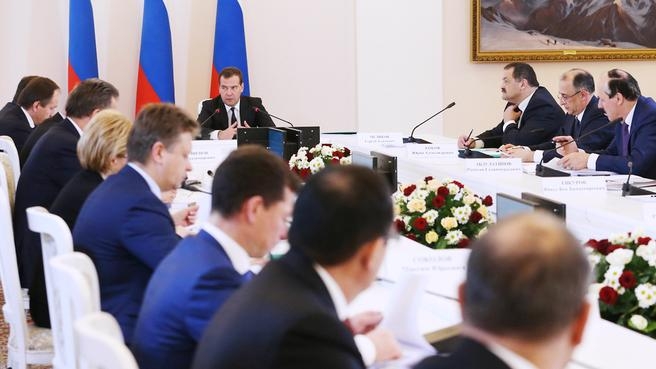Excerpt from the meeting of the Government Commission on Socioeconomic Development of the North Caucasus Federal District.
Excerpts from Dmitry Medvedev’s opening remarks:
The North Caucasus has huge import substitution potential, and the Caucasus can play a significant role in implementing the related roadmaps, building up its economic capacity and creating more jobs in manufacturing and agriculture.
The industrial base of the North Caucasus Federal District has several major projects that can significantly reduce or eliminate imports in the chemical and timber industries, among others. With some technical upgrades, local enterprises can also be used for import substitution purposes in the aviation, medical, pharmaceutical, electronics, and defence industries, as well as light industry. All these areas are important in the context of import substitution and improving the quality of Russian-made goods.
We should use existing mechanisms of government support, and create additional incentives for investors in some cases, in order to implement these projects. The working group on industrial production in the North Caucasus district at the Government Commission will be in charge of these issues.
We need to take a comprehensive approach to implementing these projects both as regards import substitution and the availability of resources. I’d like to cite one example. Experts analysed the possibility of launching the production of hard-alloy metal cutting tools in the district. In their estimate the market for such tools is worth 15 billion roubles. Today foreign companies receive the bulk of these funds. Last year 85 percent of these tools were imported. Meanwhile, the Kabardino-Balkaria Republic has the nation’s largest tungsten molybdenum deposit, which can supply the entire production cycle of hard-alloy instruments in Russia. The Government is interested in such projects and will support them.
Dmitry Medvedev: "The industrial base of the North Caucasus Federal District has several major projects that can significantly reduce or eliminate imports in the chemical and timber industries. Local enterprises can be used for import substitution purposes in the aviation, medical, pharmaceutical, electronics, and defence industries, as well as light industry."
Agriculture is no less important, all the more so since the nature of the Caucasus offers expansive opportunities for its development. Now that competition with European agricultural producers has substantially declined following the Government’s restrictions, we must concentrate on increasing vegetable and grain production and developing horticulture, winegrowing and livestock breeding, which are so characteristic and natural for the republics of the North Caucasus and the Stavropol Territory.
We should develop the logistics for storing, processing and selling produce in proportion to the larger harvests.
Investors are showing growing interest in agricultural production. As of 1 October 2014, 658 investment projects had been subsidised to the tune of 28 billion roubles. Over 5.5 billion roubles have already been transferred.
Businesses can expect government support in implementing promising projects that further import substitution, other strategic areas of North Caucasus’ economic development, including the creation of a tourism cluster. To support active companies, the Government is granting special loan guarantees for such projects. All procedures should be as transparent as possible and understandable for potential investors.
Communications are very important for business development. On the one hand, the Caucasus is a large area, but the fairly big territorial entities there are densely populated. Many people live in the Caucasus and the birth rate is high. Therefore, it is very important to improve local roads and communications there.
<…>












